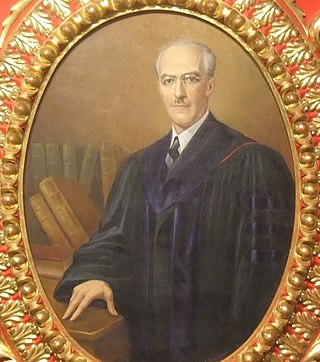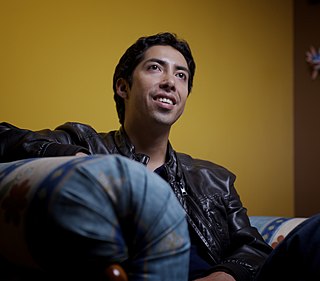Related Research Articles

Manuela Sáenz de Vergara y Aizpuru was an Ecuadorian revolutionary heroine of South America who supported the revolutionary cause by gathering information, distributing leaflets and protesting for women's rights. Manuela received the Order of the Sun, honoring her services in the revolution.

María Dhialma Tiberti was an Argentine writer. Married to the well known scientist Gregorio Baro, she studied at the Escuela Normal Nº1 Mary O’Graham, and later on, literature and history, at the Universidad Nacional de La Plata. She was responsible for the Del Bosque editions, composed of works of other well-known writers, such as Raúl Amaral, Horacio Ponce de León, Ana Emilia Lahite, and María de Villarino, who were all part of the so-called Generation del 40.
Iván Carvajal Aguirre is an Ecuadorian poet, philosopher and writer. In 1984 he received Ecuador's National Prize for Literature, the "Aurelio Espinosa Pólit" prize, for his work entitled "Parajes". In February 2013 he won the Premio a las Libertades Juan Montalvo.

Jorge Icaza Coronel, commonly referred to as Jorge Icaza, was a writer from Ecuador, best known for his novel Huasipungo, which brought attention to the exploitation of Ecuador's indigenous people by Ecuadorian whites.

Jacinto Jijón y Caamaño was an Ecuadorian historian, archeologist, and politician. He was the mayor of the city of Quito from 1946 to 1948. He was a member of the Ecuadorian parliament and a candidate for the presidency of Ecuador. He published several works about the pre-Hispanic history of cultures in Ecuador.

Ifigenia is a 1924 Venezuelan novel by Teresa de la Parra. Ifigenia marked a change in Latin American literature. The novel is a feminist critique of Caracan society in the early twentieth century. Strict moral rules are represented by the grandmother in this novel, and the character of Uncle Pancho represents the ambitious personality which was common at the time due to political corruption. Besides being a harsh criticism of society, Ifigenia is a fast-paced work with detailed descriptions. The novel caused serious problems for the author because the Venezuelan dictator Juan Vicente Gómez denied her a grant to publish the book. De la Parra decided to move to Paris. A veiled criticism of the regime of Gomez can be seen in Ifigenia.
José Rumazo González was an Ecuadorian writer, philosopher, and historian.

Alicia Yáñez Cossío is a prominent Ecuadorian poet, novelist and journalist.

Jorge Luis Cáceres is an Ecuadorian writer, editor, and anthologist.
Cecilia Eudave is a Mexican writer, researcher, and university professor.

Carmen Acevedo Vega was an Ecuadorian poet, writer, and journalist.

Alfonso Rumazo González was an Ecuadorian writer, historian, essayist and literary critic.
Tzantzismo was a cultural movement in the 1960s, Ecuador. It was founded in Quito in 1962 by Marco Muñoz and Ulises Estrella, and joined by other members throughout the 1960s. They were greatly influenced by other Ecuadorian intellectuals such as Jorge Enrique Adoum, César Dávila Andrade and Agustin Cueva. Tzantzismo was mainly expressed in poetry, and to a lesser extent in stories and theater. This literary revolutionary movement arose in response to a supposed degradation and gentrification in Ecuadorian literature.
José Enrique Ojeda was an Ecuadorian-born writer and academic. A professor at Boston College for 30 years, he was the author of several books about Latin American literature, and was called "the world's leading authority" on Ecuadoran poet Jorge Carrera Andrade. Ojeda also wrote extensively on Ecuadoran novelist Jorge Icaza.
Luz Argentina Chiriboga is an Afro-Ecuadorian writer who was one of the first writers to address the duality African and Hispanic cultures. In her poetry and novels, she writes about women in ways that challenge preconceived stereotypes. Her short story "El Cristo de la mirada baja" won first prize in 1986 in the International Literary Contest of the Liberator General San Martín held in Buenos Aires.
Elisa Ortiz de Aulestia (1909–1991) was an Ecuadorian teacher and writer. Her ideas reflected the principles of the feminist movement in the 60´s. Women´s development through education is the main topic of many of her pedagogical reflections. As an active socialist, she was a member of the PSE as she believed it to be the national revindication movement, that represented principles to fulfill Ecuadorian needs. She and her husband invested their intellectual effort, as well as their own economic resources, to change the methodology that teachers used in Ecuadorian schools. Her work is considered a milestone in the struggle to reach quality education for women.
Siomara España Muñoz is an Ecuadorian poet, essayist, professor and literary critic. She is director of the area of Literature of the House of Culture Núcleo del Guayas.
Alfonso Barrera Valverde was an Ecuadorian writer and diplomat. He was born in Ambato in 1929, the sixth of seven siblings. The family moved to Quito, where the young Alfonso studied at the Colegio La Salle and then at the Central University of Ecuador. He also did postgraduate studies at Harvard University.
Gilda Holst Molestina was an Ecuadorian writer and academic. Her narrative made use of humor and irony, in addition to the treatment of themes related to gender inequality.
Ecuadorian literature has been characterized for essentially being costumbrista and, in general, closely linked to events that are exclusively national in nature, with narratives that provide a glimpse into the life of the common citizen.The origins of Ecuadorian literature go back to the ancestral narratives that were passed down from generation to generation. These first stories dealt with fantastical, mythological, and legendary themes.